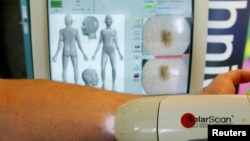Scientists in Australia say they have developed the world's first blood test to detect melanoma in its early stages. It's hoped the technique will save hundreds of lives each year by identifying cancer cells before they spread. Australia and New Zealand have the highest rates of skin cancer in the world.
Currently, skin examinations and biopsies are the most effective ways to detect melanoma. A blood test developed by university researchers in Western Australia could pick up the cancer much sooner, increasing a patient's chances of survival.
The test recognizes auto-antibodies that are part of the body's natural defenses against cancer. In a trial involving about 200 people the technique detected the early stages of skin cancer in more than 80 per cent of cases.
Professor Mel Ziman is the head of the Edith Cowan University Melanoma Research Group.
"We are hoping that it will reduce the number of people that get metastatic disease [cancer] because that is where it becomes tricky. If a thin melanoma is identified early and it is removed you have a 98 to 99 per cent chance of 5-10 year survival. So that is what we are hoping to achieve is that people will feel more comfortable going for skin checks. So it will just up the number of people that are aware and able to get their melanoma identified earlier," said Ziman.
Malignant melanoma is the most serious form of skin cancer. It is mainly caused by exposure to UV radiation.
In Australia, about 1,500 people die from the disease each year.
More clinical research on the new Australian blood test is planned in an attempt to improve its accuracy to 90 percent. The technique could be available within five years.
Researchers have said the test will not pick up other types of skin cancers such as squamous cell and basal cell carcinoma. Other health experts have said the results of the trial "need to be interpreted with caution." They have urged people to keep checking their skin as a way to detect the early signs of skin cancer.
